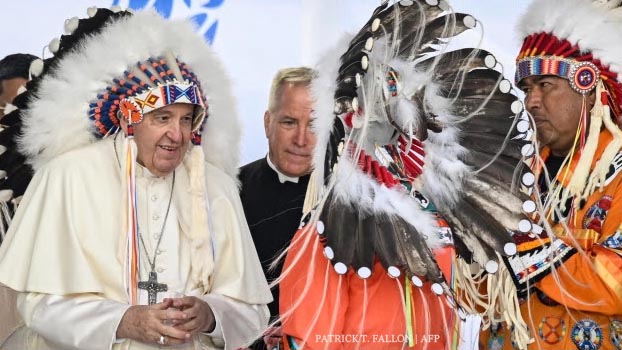Dear Friends,
This past week, Pope Francis has been on a pilgrimage to Canada and to visit the Indigenous people of Canada to make amends for the role the Catholic Church played over the years in the horrible treatment of native peoples. Hopefully you were able to catch some of the pilgrimage on the news or in social media sources. The images were quite powerful.
Pope Francis prayed for healing Tuesday from the “terrible effects of colonization” as he led a pilgrimage to a Canadian lake that has been known to native peoples for centuries as a sacred place of healing. The prayer service at Lac Sainte Anne in Alberta was one of the spiritual highlights of the pope’s six-day visit.
“In this blessed place, where harmony and peace reign, we present to you the disharmony of our experiences, the terrible effects of colonization, the indelible pain of so many families, grandparents and children,” Francis said on the shore of the lake. “Help us to be healed of our wounds.”
The ceremony fell on the Feast of St. Anne and Joachim, the grandparents of Jesus. Indigenous Catholics make yearly pilgrimages to Lac Sainte Anne to pray and to wade into its waters. Francis highlighted the importance grandmothers have in Indigenous families and recalled the critical role his own grandmother Rosa had in transmitting the faith to him as a youngster in Argentina. “Part of the painful legacy we are now confronting stems from the fact that Indigenous grandmothers were prevented from passing on the faith in their own language and culture,” he said.
Later at Mass in his homily, Pope Francis further reflected on the role of grandparents, “No one comes into this world detached from others. Our roots, the love that awaited us and welcomed us into the world, the families in which we grew up, are part of a unique history that preceded us and gave us life. We did not choose that history; we received it as a gift, one that we are called to cherish, for, as the Book of Sirach reminds us, we are ‘descendants’ of those who went before us; we are their ‘inheritance’. An inheritance that, quite apart from any claim to prestige or authority, intelligence or creativity in song or poetry, is centered on righteousness, on fidelity to God and his will. This is what they passed on to us. In order to accept who we really are, and how precious we are, we need to accept as part of ourselves the men and women from whom we are descended. They did not simply think about themselves, but passed on to us the treasure of life. We are here thanks to our parents, but also thanks to our grandparents, who helped us feel welcome in the world. Often they were the ones who loved us unconditionally, without expecting anything back. They took us by the hand when we were afraid, reassured us in the dark of night, encouraged us when in the full light of day we faced important life decisions. Thanks to our grandparents, we received a caress from the history that preceded us: we learned that goodness, tender love and wisdom are the solid roots of humanity. It was in our grandparents’ homes that many of us breathed in the fragrance of the Gospel, the strength of a faith which makes us feel at home. Thanks to them, we discovered that kind of ‘familiar’ faith, a domestic faith. Because that is how faith is fundamentally passed on, at home, through a mother tongue, with affection and encouragement, care and closeness.
This is our history, to which we are heirs and which we are called to preserve. We are children because we are grandchildren. Our grandparents left a unique mark on us by their way of living; they gave us dignity and confidence in ourselves and others. They bestowed on us something that can never be taken from us and that, at the same time, allows us to be unique, original and free. From our grandparents we learned that love is never forced; it never deprives others of their interior freedom. That is the way Joachim and Anne loved Mary and Jesus; and that is how Mary loved Jesus, with a love that never smothered him or held him back, but accompanied him in embracing the mission for which he had come into the world. Let us try to learn this, as individuals and as a Church. May we learn never to pressure the consciences of others, never to restrict the freedom of those around us, and above all, never to fail in loving and respecting those who preceded us and are entrusted to our care. For they are a precious treasure that preserves a history greater than themselves.”
Peace,
Fr. Damian



